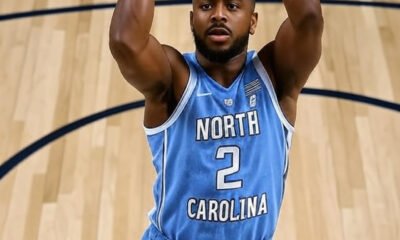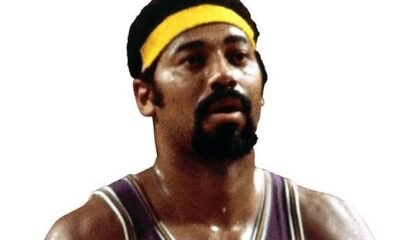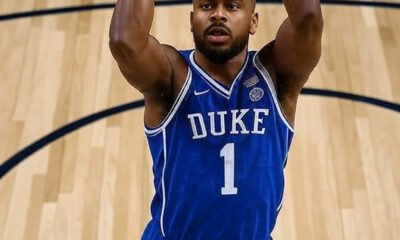Blog
Just In: No.1 top player in America just signed a $4 million deal with Michigan Wolverines football team
*Breaking News: America’s Top Football Player Signs $4 Million Deal with Michigan Wolverines
In a groundbreaking development that has electrified the college football world, the Michigan Wolverines have announced the signing of the nation’s No. 1 ranked football player, **Jordan Carter**, in a deal reported to be worth $4 million. This marks a historic milestone not only for Michigan but also for college athletics, signaling a new era of star power and lucrative opportunities in collegiate sports.
### The Player: Jordan Carter
Jordan Carter, a 6-foot-4, 220-pound quarterback from Los Angeles, California, has been widely regarded as the most talented and promising player in the country. His combination of arm strength, mobility, football IQ, and leadership qualities has made him an elite prospect since his early high school days.
Throughout his high school career at Westlake High, Carter threw for over 5,000 yards and 60 touchdowns, earning multiple national awards and accolades, including the Gatorade National Player of the Year and USA Today High School Football Player of the Year. His recruitment process was closely watched, with top programs vying for his commitment. Ultimately, Carter chose Michigan, citing their innovative offensive scheme, coaching staff, and the university’s strong academic reputation.
### The Deal: A New Paradigm in College Sports
The $4 million deal is unprecedented in college football history, shattering previous records for unsigned college athletes and raising questions about the evolving landscape of amateur athletics.
While college athletes are traditionally considered amateurs, recent changes in NCAA policies and the proliferation of Name, Image, and Likeness (NIL) rights have opened doors for players to monetize their popularity. The Michigan deal, however, appears to be a unique arrangement, possibly involving endorsements, branding, and other financial incentives.
Sources close to the negotiations indicate that the deal includes:
– An initial signing bonus of $1 million.
– Performance-based incentives that could total an additional $1 million based on on-field achievements.
– Endorsement and merchandise royalties estimated at $1 million annually.
– Personal branding and social media promotion contracts worth $1 million over the next year.
This comprehensive package not only compensates Carter for his athletic talent but also positions him as a marketable figure, potentially paving the way for future NIL deals for college athletes.
### The Significance of the Deal
This historic signing is viewed as a watershed moment in college sports, challenging traditional notions of amateurism and raising questions about fairness, recruiting, and the future of college athletics.
**Implications for NCAA and College Sports:**
– **Evolution of NIL Rights:** The Michigan deal exemplifies how NIL rights are transforming college sports, allowing athletes to capitalize on their fame while still in school.
– **Potential for Increased Recruitment Competition:** Top programs may now offer lucrative deals or incentives to secure star athletes, possibly leading to a bidding war reminiscent of professional sports.
– **Legal and Ethical Debates:** Critics argue that such deals could undermine the amateur spirit of college athletics, creating disparities among players and programs.
**Impact on Michigan Wolverines:**
– The Wolverines, under head coach Jim Harbaugh, are positioning themselves as a powerhouse capable of attracting top-tier talent through innovative recruiting strategies.
– Carter’s signing could boost team morale, recruitments, and the university’s brand recognition nationally.
### Reactions from Key Stakeholders
**University Leadership:**
Michigan Athletic Director Warde Manuel expressed excitement about Carter’s signing, stating, “Jordan is an exceptional talent who embodies the spirit of Michigan football. We are committed to supporting our players both on and off the field and believe this deal reflects our dedication to their success.”
**NCAA and College Sports Authorities:**
While the NCAA has historically maintained strict amateurism rules, recent policy adjustments and court rulings have allowed for NIL compensation. NCAA President Charlie Baker commented, “We are witnessing a new chapter in college athletics. Our priority remains ensuring fair play and maintaining the integrity of competition while respecting athletes’ rights to monetize their NIL.”
**Legal Experts and Critics:**
Legal analysts have raised concerns about the potential for exploitation and unequal treatment among athletes. Professor Lisa Monroe of the University of Michigan Law School noted, “While NIL rights are a positive development, we must ensure that regulations are in place to prevent undue influence and preserve the educational mission of college sports.”
**Fans and Media:**
Fans are buzzing on social media, with many praising Carter’s talent and Michigan’s bold move. Sports commentators speculate that this could set a precedent, leading to a new era where college athletes are viewed similarly to minor league professional players.
### The Broader Context: College Football’s Changing Landscape
The signing of Carter highlights a broader trend where college athletics are increasingly commercialized. The recent Supreme Court decision in NCAA v. Alston (2021) and subsequent NCAA policy reforms have paved the way for athletes to profit from their NIL rights, fundamentally altering the recruiting landscape.
Major programs across the country are exploring ways to leverage NIL deals to attract top prospects. Some schools have partnered with local businesses, while others create in-house NIL collectives designed to pool resources and offer incentives.
Michigan’s approach with Carter could serve as a blueprint for other programs seeking to elevate their recruiting efforts. The deal also underscores the importance of branding, social media presence, and marketability in modern college recruitment.
### Future Outlook
Jordan Carter’s signing may just be the beginning. As college sports continue to evolve, several key questions loom:
– **Will more top players demand similar deals?**
As NIL opportunities grow, high-profile athletes might expect substantial compensation, potentially leading to disparities between programs.
– **How will this impact team dynamics?**
Financial incentives could influence locker room chemistry, motivation, and team cohesion.
– **What regulatory measures will be implemented?**
The NCAA and lawmakers may introduce new policies to manage NIL deals, prevent exploitation, and ensure competitive balance.
– **Could this lead to a semi-professional model?**
Some experts fear that college sports might resemble minor league professional systems, blurring the lines between amateurism and professionalism.
### Final Thoughts
The signing of the No. 1 college football player, Jordan Carter, to a $4 million deal with the Michigan Wolverines is a landmark event that symbolizes the ongoing transformation of college athletics. It highlights the increasing importance of athlete branding, NIL rights, and the commercial potential inherent in college sports.
While some celebrate the opportunities for athletes to earn compensation and build their brands, others express concerns about fairness, exploitation, and the preservation of educational values. As this new chapter unfolds, stakeholders across the spectrum will need to navigate the complex landscape carefully.
Michigan’s bold move sets a precedent and sparks a conversation about the future of college football—one where talent, marketability, and financial opportunity intertwine more than ever before. Whether this signals a sustainable evolution or a temporary anomaly remains to be seen, but one thing is clear: college football will never be the same.
-

 Arsenal2 years ago
Arsenal2 years agoSad News Arsenal ex player who is goal scorer confirmed dead this morning
-
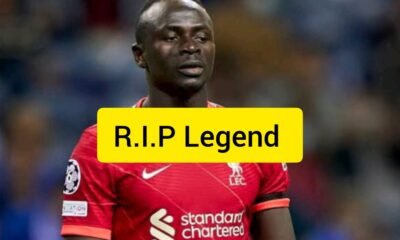
 Liverpool2 years ago
Liverpool2 years agoSad News Sadio Manè Confirmed Dead Today By Sky Sports Reporters, Open For Full Story 👇
-

 Blog1 year ago
Blog1 year ago“I was forcefully removed from Manchester United squad and now I’ve joined the best team in the world…I will revenge and as a result, I’ve ordered my friend who’s their best player currently to leave there with immediate effect and he has agreed”: Former Man United player angered by United decision to removed him from the squad as he ordered the Club’s best player to leave immediately.
-

 Blog1 year ago
Blog1 year agoSad News: Manchester United player died when playing for his country England yesterday 😢 😔
-

 Blog2 years ago
Blog2 years agoR.I.P: Formal Real Madrid and France international confirm death this morning
-

 Chelsea2 years ago
Chelsea2 years agoBreaking New:”Roman Abramovich could get Chelsea back”? Chelsea owner review the conversation between him and Roman Abramovich in. Deal about getting Chelsea back
-

 Blog2 years ago
Blog2 years agoUNBELIEVABLE: Manchester City midfielder KELVIN DE BRUYNE divorced wife this morning after DNA test revealed their 5 years old son belongs to formal Manchester United player
-
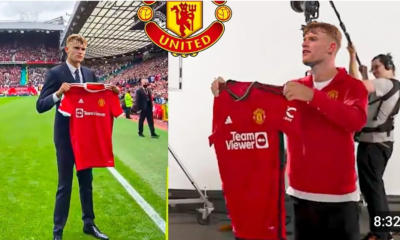
 Manchester United1 year ago
Manchester United1 year agoOFFICIAL NOW: Manchester United announce the signing of 23yr sensational player after beating Liverpool and Madrid for His signature, agreement reached on a 5yr deal, Medical completed – announcement ongoing



